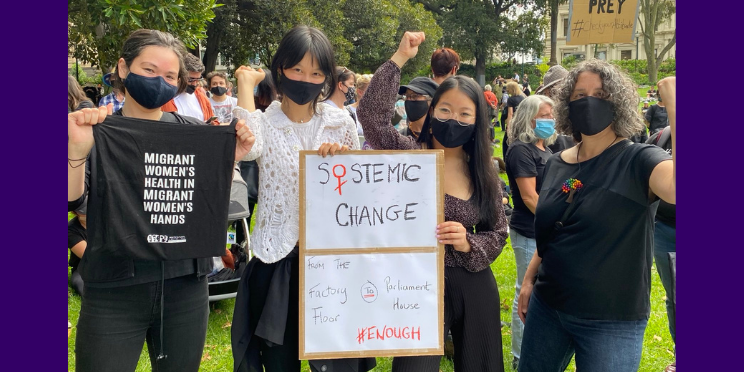
Workplace sexual harassment and gendered violence hit the headlines with a vengeance this month, spurring women to hit the streets, the megaphones and their keyboards to make sure these pressing problems do not yet again fall off the national agenda.
While all eyes are rightly on Parliament House, we are reminded that gendered discrimination, gendered violence and harassment are not limited to any particular workplace. There is no workplace or worker that is immune: gendered discrimination and harassment in workplaces happen with alarming regularity. Last year the Respect@Work Australian Human Rights Commission report found that sexual harassment in the workplace is highly common. An astounding 39% of women workers experienced workplace sexual harassment in the last five years.
The national survey on which the report was based under-represented women from migrant and refugee communities, but the Commission nevertheless concluded that migrant and refugee women are more likely than the general population to experience sexual harassment. It was clear that the workplaces where sexual harassment is more likely to occur, including male dominated workplaces and settings such as retail, hospitality and health care and social assistance, are those in which migrant women are highly represented.
Certainly, on a global level, the increased risks of violence for migrant women workers have been well documented. The lack of decent, properly paid and stable employment for migrant women exacerbates that risk, as does the combination of precarious visa status, economic exclusion and social isolation. In Australia, we have seen how the vicious double whammy of wage exploitation and migration precarity has led to unchecked sexual violence and harassment of migrant women workers on farms.
This is a crucial political moment. Gendered violence and harassment in the workplace are being widely exposed and better understood. Women from all walks of life are speaking out about their experiences and venting their anger. Importantly, they are telling the community and leadership what needs to be done to achieve gender equity and freedom from violence. At this pivotal moment, we need to listen to migrant women workers to better understand the ways inequality and racism can lead to workplace violence and harassment. We need to ensure that we render visible all women workers at risk by focusing explicitly on those workplaces where intersecting inequality and discrimination are most acute.
The WRAP is a monthly newsletter about migrant women’s issues. Subscribe to our mailing list here.
